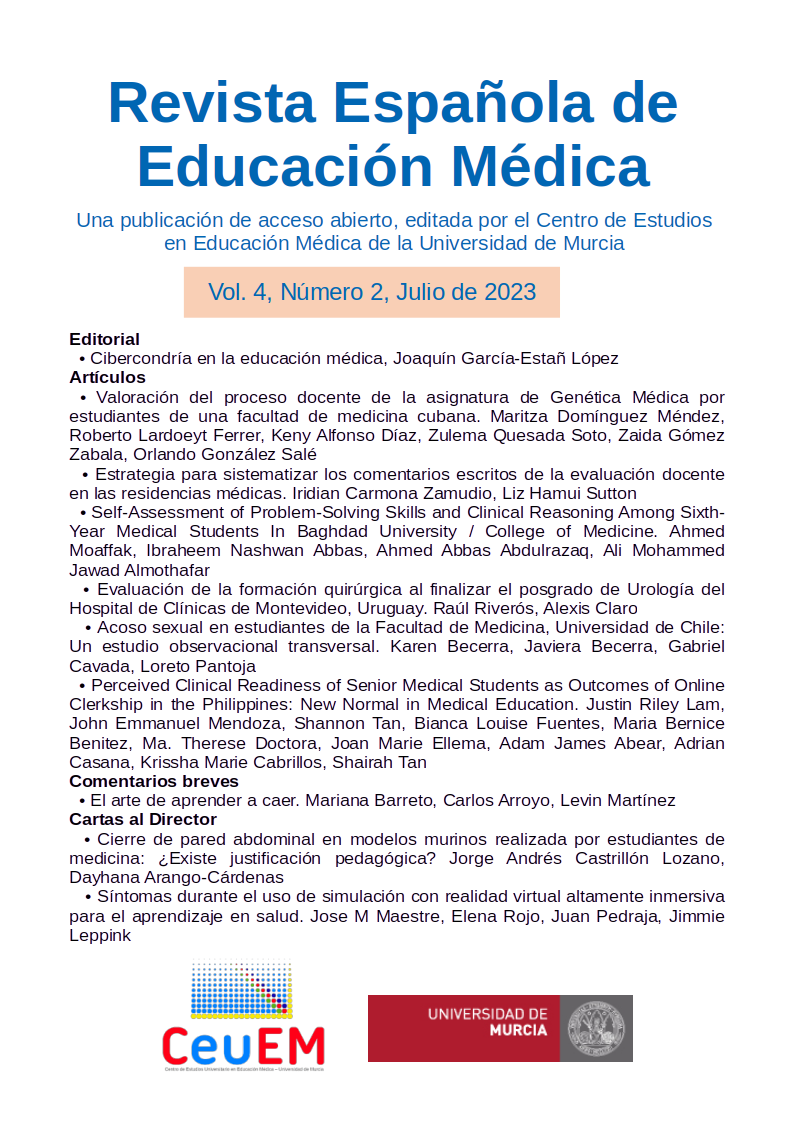Estrategia para sistematizar los comentarios escritos de la evaluación docente en las residencias médicas.
Resumen
La evaluación de las opiniones de los residentes sobre sus programas, sedes, profesores y demás aspectos de su quehacer diario en las especialidades médicas, puede ser útil para mejorar aspectos de su formación. Los espacios abiertos para obtener comentario escritos (CE) sobre su experiencia constituyen una oportunidad para comprender con mayor profundidad la labor docente, las problemáticas en el hospital y las fortalezas del programa educativo. El objetivo de este estudio es proponer una estrategia de tres pasos para sistematizar los CE de la evaluación al docente por parte de los médicos residentes, ejemplificada con el análisis de 721 CE de 721 residentes obtenidos por medio del Instrumento de Evaluación Docente, aplicado de manera virtual en agosto del 2022. Los CE requieren de la lectura atenta y pueden ser codificados para identificar categorías y desde ahí teorizar los hallazgos; proponemos en el ámbito de las residencias médicas la clasificación en tres categorias generales: estructurales, organizacionales e interpersonales para su aplicación en futuros estudios de esta índole. El relato de la experiencia y la valoración de los eventos son elementos centrales para acercarse a lo que sucede en los espacios educativos en la práctica clínica.
Descargas
Métricas
-
Resumen334
-
pdf233
Citas
1. Sun H, Chen D, Warner DO, Zhou Y, Nemergut EC, Macario A, Keegan MT. Anesthesiology Residents' Experiences and Perspectives of Residency Training. Anesth Analg, 2021, 1;132(4), 1120-1128. http://doi.org/10.1213/ANE.0000000000005316
Acosta Fernández M, Aguilera Velasco MÁ, Torres López TM, et al. Factores psicosociales y formación académica. Percepción de residentes y profesores. Med Int Mex, 2022, 38(1), 51-66. https://doi.org/10.24245/mim.v38i1.4811
Ten Cate O, Schwartz A, Chen HC. Assessing Trainees and Making Entrustment Decisions: On the Nature and Use of Entrustment-Supervision Scales. Acad Med., 2020, 95(11), 1662-1669. http://doi.org/10.1097/ACM.0000000000003427
Ten Cate O, Regehr G. The power of subjectivity in the assessment of medical trainees. Acad Med. 2019, 94, 333–337. http://doi.org/10.1097/ACM.0000000000002495
Young JQ, Sugarman R, Holmboe E, O'Sullivan PS. Advancing Our Understanding of Narrative Comments Generated by Direct Observation Tools: Lessons From the Psychopharmacotherapy-Structured Clinical Observation. J Grad Med Educ. 2019, 11(5), 570-579. http://doi.org/10.4300/JGME-D-19-00207.1
Lefebvre C, Hiestand B, Glass C, Masneri D, Hosmer K, Hunt M, Hartman N. Examining the Effects of Narrative Commentary on Evaluators' Summative Assessments of Resident Performance. Eval Health Prof. 2020, 43(3).159-161. http://doi.org/10.1177/0163278718820415
Ginsburg S, Watling CJ, Schumacher DJ, Gingerich A, Hatala R. Numbers Encapsulate, Words Elaborate: Toward the Best Use of Comments for Assessment and Feedback on Entrustment Ratings. Acad Med, 2021 1;96(7S), S81-S86. http://doi.org/10.1097/ACM.0000000000004089
Hamui Sutton L, Sanchez Guzmán MA, Paulo Maya A, et al. Interacciones y narrativas en la clínica: más allá del cerebro. 1ra ed. CDMX, México, Facultad de Medicina, UNAM, 2022.
Hamui Sutton L, Vives Varela T. La codificación y categorización en la teoría fundamentada, un método para el análisis de los datos cualitativos. Investigación educ. médica, 2021, 10(40), 97-104. https://doi.org/10.22201/fm.20075057e.2021.40.21367.
Cook DA, Kuper A, Hatala R, Ginsburg S. When Assessment Data Are Words: Validity Evidence for Qualitative Educational Assessments. Acad Med, 2016, 91(10), 1359-1369. http://doi.org/10.1097/ACM.0000000000001175
Holm EA, Al-Bayati SJL, Barfod TS, Lembeck MA, Pedersen H, Ramberg E, Klemmensen ÅK, Sorensen JL. Feasibility, quality and validity of narrative multisource feedback in postgraduate training: a mixed-method study. BMJ Open. 2021, 11(7):e047019. http://doi.org/10.1136/bmjopen-2020-047019
Lockyer JM, Sargeant J, Richards SH, Campbell JL, Rivera LA. Multisource Feedback and Narrative Comments: Polarity, Specificity, Actionability, and CanMEDS Roles. J Contin Educ Health Prof, 2018, 38(1), 32-40. http://doi.org/10.1097/CEH.0000000000000183
Hatala R, Sawatsky AP, Dudek N, Ginsburg S, Cook DA. Using In-Training Evaluation Report (ITER) qualitative comments to assess medical students and residents: A systematic review. Acad Med. 2017, 92, 868–879. http://doi.org/10.1097/ACM.0000000000001506
Tremblay G, Carmichael PH, Maziade J, Gregoire M. Detection of residents with progress issues using a keyword-specific algorithm. J Grad Med Educ. 2019, 11, 656–662. http://doi.org/10.1097/ACM.0000000000002495
Hamui Sutton L, Vives Varela T. Las preguntas analíticas en investigación cualitativa. Investigación En Educación Médica, 2022, 11(41), 97-102. DOI: https://doi.org/10.22201/fm.20075057e.2022.41.21415
Ginsburg S, Regehr G, Lingard L, Eva KW. Reading between the lines: Faculty interpretations of narrative evaluation comments. Med Educ. 2015, 49, 296–306. http://doi.org/10.1111/medu.12637
Ginsburg S, Kogan JR, Gingerich A, Lynch M, Watling CJ. Taken out of context: Hazards in the interpretation of written assessment comments. Acad Med. 2020, 95, 1082–1088. http://doi.org/10.1097/ACM.0000000000003047
Wilby KJ, Govaerts MJB, Dolmans DHJM, Austin Z, van der Vleuten C. Reliability of narrative assessment data on communication skills in a summative OSCE. Patient Educ Couns. 2019,102, 1164–1169. http://doi.org/10.1016/j.pec.2019.01.018
Derechos de autor 2023 Servicio de Publicaciones de la Universidad de Murcia

Esta obra está bajo una licencia internacional Creative Commons Atribución-NoComercial-SinDerivadas 4.0.
Las obras que se publican en esta revista están sujetas a los siguientes términos:
1. El Servicio de Publicaciones de la Universidad de Murcia (la editorial) conserva los derechos patrimoniales (copyright) de las obras publicadas y favorece y permite la reutilización de las mismas bajo la licencia de uso indicada en el punto 2.
© Servicio de Publicaciones, Universidad de Murcia
2. Las obras se publican bajo una licencia Creative Commons Reconocimiento-NoComercial-SinObraDerivada 4.0.
![]()
3. Condiciones de auto-archivo. Se permite y se anima a los autores a difundir electrónicamente las versiones preprint (versión antes de ser evaluada y enviada a la revista) y/o post-print (versión evaluada y aceptada para su publicación) de sus obras antes de su publicación, ya que favorece su circulación y difusión más temprana y con ello un posible aumento en su citación y alcance entre la comunidad académica.




















